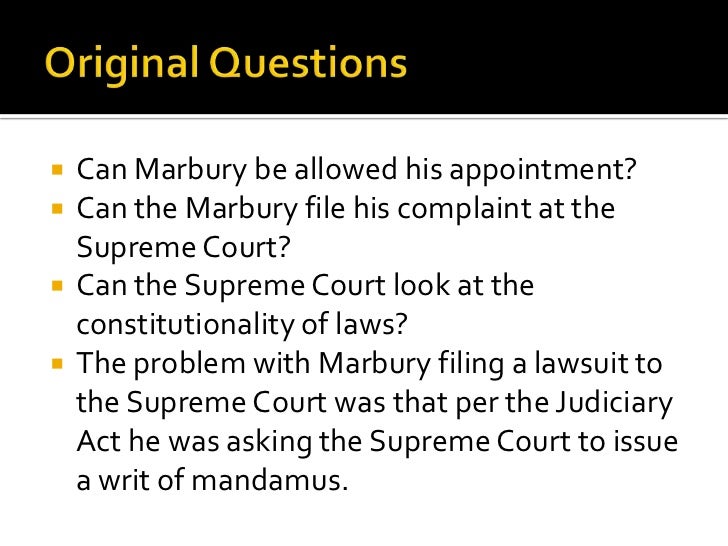

With the ability to potentially issue a writ of mandamus now in place, Marbury argued that in not allowing the commissions to be delivered that Secretary of State Madison is not following his constitutional duties and thus should be compelled to deliver on his obligation. Marbury, a would-be recipient of a commission petitions the Supreme Court to issue a writ of mandamus (Mcbride 2006). Upon entering office, however, Jefferson tells his Secretary of State, James Madison, to not deliver the commissions required. Before leaving office Adams appointed many persons to be Justices of the Peace for which they were required commissions-confirmed by the Senate, signed by the President and sealed by the Secretary of State.

Madison, in 1800, then-Republican Thomas Jefferson defeated incumbent president Adams, a Federalist. The question as to if it is acceptable to issue such a writ, and whether Congress is able to give the Supreme Court such writ-issuing authority in the first place, comes during Thomas Jefferson’s first term in office, a term rife with political upheaval.Three years prior to the court decision in Marbury v. Among the many powers delegated to the court within the Judiciary Act of 1789 is the ability to issue a writ of mandamus, “a court order to a government agency or another court to correct its previous illegal behavior in order to comply with the law” (The Law Dictionary, n.d.).
#Marbury v madison trial
Now, the Judiciary would have district courts comprised of one judge and one court over which to adjudicate there would be circuit courts, primarily trial courts by nature and which would wield appellate jurisdiction over cases and there would be established a Supreme Court comprised of one Chief Justice (Britanica 2009). That changed In 1789, however, when The Judiciary Act was passed. Whereas Congress’ enumerated powers clearly give it the authority to, say, “constitute tribunals inferior to the Supreme Court, in Article I, Section 8 (Constitution Center, n.d.) the Judiciary’s duties were yet clear. In all the other cases before mentioned, the Supreme Court shall have appellate jurisdiction…” (Institute n.d.). As Article III, Section II, Clause II notes in part, “I n all cases affecting ambassadors, other public ministers and consuls, and those in which a state shall be party, the Supreme Court shall have original jurisdiction. But regardless of their exercise of it, the Supreme Court had never yet explicitly stated their authority to do so until 1803 because, in part, the very document which created the Judiciary in the first place was rather scant as to its powers, and jurisdiction.ĭuring the writing of the Constitution, the Judiciary- particularly the Supreme Court and its jurisdiction–, third amongst the branches to be listed was but mentioned briefly. Telfair Justice Chase even remarked with nuance that perhaps the court could find unconstitutional acts of Congress (Wikipedia 2016). Hylton the same year and in 1800, in Cooper v. in 1796 a Virginia state statute relating to Revolutionary War debts as void in Ware v. And in the intervening years between 17 the Supreme Court indeed echoed the finding of New Jersey’s highest court: finding a “carriage tax” constitutional on non-direct taxation grounds in Hylton v. Walton in which a six-man jury was deemed unconstitutional in certain capital cases by the New Jersey Supreme Court was the first instance of this reliance.) (Harbison 1991). First Timeline:įrom its earliest days American jurisprudence has relied, if even unwritten, on the idea of judicial review. Given the supremacy clause, the constitution was deemed the supreme law and Marbury’s commission was denied and the case was discharged.

The decision of the court also called into question the Judiciary Act of 1789 and if the constitution was superior or not. The case surrounds the question of whether or not William Marbury’s right to a commission is valid and if he is due a mandamus from the court. This judicial review power allows the Supreme Court to invalidate or declare unconstitutional actions or laws created by levels of government.

Supreme Court case that established the precedent of judicial review.


 0 kommentar(er)
0 kommentar(er)
